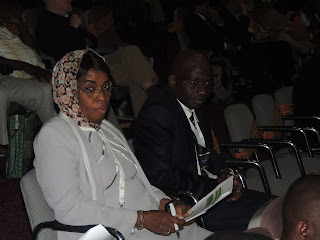 |
| IITA DG Sanginga speaking at the AASW in Accra |
“The issue of soil fertility must be addressed if Africa wants to feed itself,” he said today.
The IITA boss expressed optimism for Africa’s agricultural transformation, highlighting the increasing attention being paid to agriculture by governments on the continent.
However, he reiterated that efforts need to focus on restoring soil fertility, creating an enabling environment for market policies, and developing more resilient and productive farm systems.
He warned against policies that limit African researchers from taking advantage of modern technologies, stressing that such a move would deprive Africa from making progress and put the continent farther from the African Green Revolution.
The 6th Africa Agricultural Science Week provided an opportunity for Africans and partners to rethink the commitment by African governments 10 years ago which also led to the establishment of the Comprehensive Africa Agriculture Development Programme (CAADP).
CAADP focuses on improving food security, nutrition, and increasing incomes in Africa's largely farming based economies. It aims to do this by raising agricultural productivity by at least 6% per year and increasing public investment in agriculture to 10% of national budgets per year. So far, only a few countries have met the CAADP targets.
Dr Kanayo Nwanze, President of the International Fund for Agricultural Development (IFAD), said there is still a lot to be done in the context of the ever-changing and increasing challenges choking agricultural development in Africa.
He noted that the world is producing enough but that the food is not reaching those that need it most.
"We must put our efforts both in improving productivity and reducing postharvest losses," he added.
The IFAD President called for a paradigm shift in addressing food insecurity in Africa.
According to him, research and development need to be “repositioned” into research for development to bring the benefits of research to the farm. He advised scientists to ensure that their research is in consonance with the reality on ground and that it addresses the challenges of development in an empirical manner.
.gif)


















